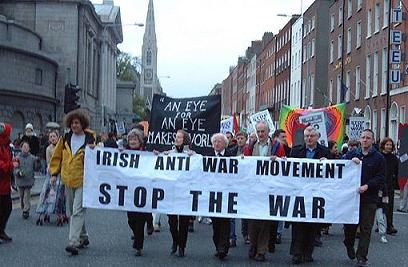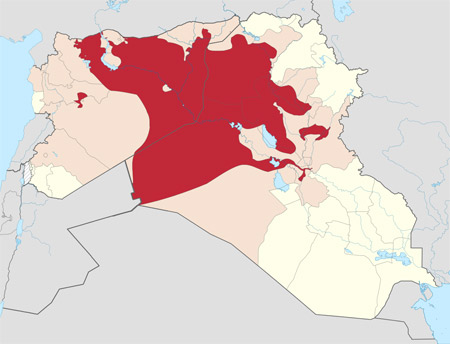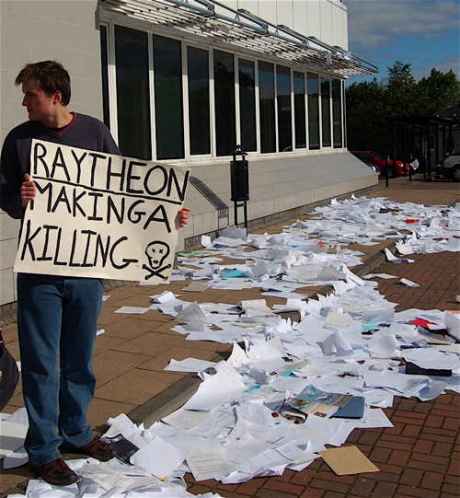Over 30 years of anarchist writing from Ireland listed under hundreds of topics
Iraq war
Direct Action against the Iraq war in Ireland
 Across the globe millions of people mobilised against the war in Iraq. On February 15th 100,000 people marched through the streets of Dublin in the biggest political protest in Southern Ireland for over 20 years. Around 15,000 demonstrated in Belfast on the same day.
Across the globe millions of people mobilised against the war in Iraq. On February 15th 100,000 people marched through the streets of Dublin in the biggest political protest in Southern Ireland for over 20 years. Around 15,000 demonstrated in Belfast on the same day.
The turnout on these demonstrations showed that the battle for public opinion had been won. Massive numbers of people opposed Bush and Blair's drive to war and the Irish government's role in it. But they seem to have had very little effect on the war. The governments concerned simply ignored them. In every country the anti-war movement was thus faced with the question of what to do next. After February 15th we should have expected to see the various movements internationally working on ways to stop the war despite the fact that their respective governments were ignoring them.
The IAWM's dismal leadership" A critique of the politics of Trotskyism

After months of regularly attending the Irish Anti-War Movement's marches and particularly after months of listening to the speeches of the leading lights of the IAWM my head is buzzing with cant and rhetoric and I have that dejected feeling you get when you know you have just lost a chance that won't be coming around again for a long time.
Origins of the hostility and the split between Al Qa’ida and ISIS
 Geo-strategically the Al Qa’ida leadership (Azzam, bin Laden, Zawahiri) are products of the Cold War, specifically the Afghan Mujahidin war against the USSR. Rather like their American neo-con previous employers, Al Qa’ida view the end of the Cold War as a victory over the USSR by their own side. The Al Qa’ida perspective is that, having “defeated” one superpower, the global jihad now needs to turn its offensive against the remaining superpower. Al Qa’ida worry that the Zarqawists of ISIS may be restricting the struggle to a parochial Mesopotamian sectarian struggle that could fail to engage Muslim jihadists around the world, outside the MENA region, say in West Africa or Indonesia and the Philippines where the US is a more credible #1 enemy than Iran.
Geo-strategically the Al Qa’ida leadership (Azzam, bin Laden, Zawahiri) are products of the Cold War, specifically the Afghan Mujahidin war against the USSR. Rather like their American neo-con previous employers, Al Qa’ida view the end of the Cold War as a victory over the USSR by their own side. The Al Qa’ida perspective is that, having “defeated” one superpower, the global jihad now needs to turn its offensive against the remaining superpower. Al Qa’ida worry that the Zarqawists of ISIS may be restricting the struggle to a parochial Mesopotamian sectarian struggle that could fail to engage Muslim jihadists around the world, outside the MENA region, say in West Africa or Indonesia and the Philippines where the US is a more credible #1 enemy than Iran.
Policing the anti-war movement in Ireland
The following exploration of the policing of the anti-war demonstrations will be in two parts: the first will look at the change in policing through the eyes of a participant, a new activist, while the second will make a more thorough examination of the forces at work which lead to such a massive escalation in the policing of anti-war protest, particularly at Shannon, both on the side of the protesters and that of the gardaí.
American Soldiers Speak Out Against The War
While in Florida, Andrew Flood of the WSM attended a local 'Winter Soldier' hearing. These are public meetings where United States ex-soldiers of the Iraq testify against the war.
The Unions, Democracy and Iraq
When it became clear to the Bush administration that weapons of mass destruction would not be found a tactical decision was made. The new focus of the invasion and occupation would be the "liberation of Iraq" and the creation of a "democratic state" as a model for the middle east. Unless "democratic state" means technocratic oligarichy willing to ally themselves with US interests in exchange for power, then one must thouroughly reject the veracity of this new focus.
Slaves May Not Leave Their Masters
The number of soldiers absconding from the British Army has trebled since the invasion of Iraq. The high profile case of RAF officer Malcolm Kendall-Smith, who has been jailed for refusing to return to Iraq to fight what he regarded as an illegal war, is an indication of the discontent within the armed forces.
Jury Frees Anti-War Saboteurs
Five peace activists have been acquitted of all charges in relation to their disarming of a US navy plane at Shannon airport in February 2003. The five, calling themselves the Pitstop Ploughshares, used axes and lump hammers to inflict over $2.5m worth of damage in what they described as a “non-violent ploughshares action”. In June they received a unanimous acquittal by using Section 6 of the Criminal Damage Act 1991 which allows for a “lawful excuse” where the damage is caused “in order to protect another or property belonging to another.” They say they were acting in defence of civilian life in Iraq, the local infrastructure, the lives of US soldiers and of Irish people who may become targets of a terrorist attack as a result of Irish complicity in the war.
WSM Supports Direct Action Against RAYTHEON.
 The Workers Solidarity Movement supports the actions of the anti-war protestors who occupied and sabotaged American arms manufacturer Raytheon's Derry offices. Protesters occupied the plant for eight hours.
The Workers Solidarity Movement supports the actions of the anti-war protestors who occupied and sabotaged American arms manufacturer Raytheon's Derry offices. Protesters occupied the plant for eight hours.
Derry; FEIC monthly vigil at Raytheon harrassed by PSNI riot squad, children videotaped
The peaceful and carnival atmosphere at yesterday evenings (Saturday 12 August) FEIC's monthly vigil in front of Raytheon was shattered when 2 landrovers full of riot gear clad PSNI de-bussed and began filming and corralling protesters.

